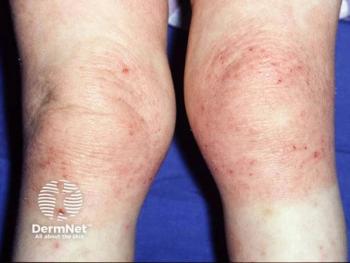
Rethinking Itch Severity in Atopic Dermatitis
Brian Kim, MD, underscores the critical gap in addressing severe itch in atopic dermatitis, often overshadowed by the visible manifestations of skin rash.
Episodes in this series

This news content has been independently developed and is not endorsed by the American Academy of Dermatology.
In this Dermatology Times Expert Perspectives series, 5 experts delve into the multifaceted aspects of pediatric atopic dermatitis care including demographic variances to long-term safety and efficacy, comparative analyses, key takeaways from recent research, personalized approaches, and future research directions. Discover clinical insights into the role of ruxolitinib (Opzelura) in addressing critical challenges and enhancing patient outcomes.
Brian Kim, MD, professor of dermatology at the Icahn School of Medicine at Mount Sinai in New York, New York, delves into the complexities of AD, highlighting the evolving landscape of diagnostics and treatment. While advancements abound, he underscores the critical gap in addressing severe itch, often overshadowed by the visible manifestations of skin rash. Kim advocates for a paradigm shift, urging the medical community to prioritize itch assessment alongside traditional markers of disease severity, thus paving the way for enhanced patient care and management strategies in AD.
Dermatology Times Interview w/h Brian Kim, MD
Dermatology Times: What is upcoming in the atopic dermatitis landscape?
Kim: There's a lot coming in AD, it's hard for me to even go over the whole list of things to look out for you know, I mentioned a number of different pathways that people are looking at. At but also I think the thing to think about AD also is: Where are the gaps?
So I think actually the population is growing and a big population that's overlooked is patients with severe itch and more moderate or even mild disease, and I think a paradox right now in the field of AD is that you could actually have based on your skin, a rash that looks moderate or even mild to moderate. But if you have 10 out of 10, severe itch, you're still considered to have mild to moderate disease. And I think we need to get beyond that. And this is something that is a bit of a problem to me. I think that itch in atopic dermatitis needs to be still looked at much more closely and much more seriously by everyone in the field. We see patients even who go on biologics that have residual itch, but because their rash is better, we think that they're better and there's not much more we need to know but I think we can really improve that. And so there's a lot more growth to be had in AD diagnosis, management, and treatment.
Transcript edited for clarity
Newsletter
Like what you’re reading? Subscribe to Dermatology Times for weekly updates on therapies, innovations, and real-world practice tips.

















